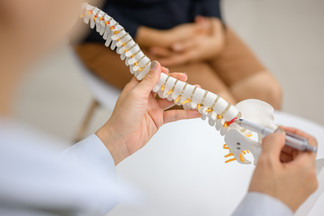Posted by Dee Cee Labs on Sep 17th 2025
How Dehydration Impacts Spinal Disc Health
Water is one of the most vital elements for human health, and nowhere is this more apparent than in the spine. Spinal discs are highly dependent on hydration to function properly. These discs act as cushions between vertebrae, absorbing shock and allowing smooth movement. When the body becomes dehydrated, spinal discs are among the first tissues to suffer, leading to pain, stiffness, and long-term degeneration.
For chiropractic patients, understanding the relationship between hydration and spinal disc health is critical. Proper hydration not only supports adjustments but also helps maintain long-term spinal integrity.
The structure of spinal discs
Spinal discs are made up of two main components. The outer layer, called the annulus fibrosus, is a tough, fibrous ring that provides strength and stability. Inside this ring is the nucleus pulposus, a gel-like center that contains mostly water. This central core is responsible for absorbing shock during movement and maintaining the height and spacing between vertebrae.
When hydration is adequate, discs remain plump and flexible, keeping the spine properly aligned. When hydration is lacking, discs lose volume, which compromises their ability to cushion the vertebrae.
How dehydration damages spinal discs
Dehydration reduces the water content within the nucleus pulposus. Over time, this can lead to disc desiccation, a condition where discs dry out and shrink. This has several negative consequences:
-
Loss of disc height: Dehydrated discs collapse, reducing the spacing between vertebrae and increasing pressure on nerves.
-
Reduced shock absorption: Without water, discs cannot properly absorb forces from movement, leading to pain and stiffness.
-
Higher risk of herniation: Dry, brittle discs are more prone to tearing, which can result in bulging or herniated discs.
-
Spinal misalignment: Collapsing discs alter spinal structure, making it harder for chiropractic adjustments to hold.
The link between dehydration and chronic back pain
Many patients with recurring back pain are unaware that dehydration may be a contributing factor. Even mild dehydration can make discs more vulnerable to strain and injury. Since discs do not have a direct blood supply, they rely on the surrounding fluid environment to receive hydration and nutrients. Poor water intake combined with a sedentary lifestyle can accelerate disc degeneration and prolong recovery times.
How chiropractic care helps
Chiropractic adjustments restore alignment and improve mobility, which enhances fluid exchange in the spinal discs. Gentle movement of the spine encourages water and nutrients to diffuse into the discs, promoting rehydration. However, without adequate water intake, these benefits are limited. Patients who prioritize hydration alongside chiropractic care often report longer lasting relief and improved flexibility.
Dehydration is a hidden factor in many cases of spinal discomfort and disc degeneration. Since discs rely so heavily on water for structure and function, even small drops in hydration can cause pain, stiffness, and misalignment. Pairing proper hydration with chiropractic care helps preserve disc health, reduce pain, and improve adjustment retention.

